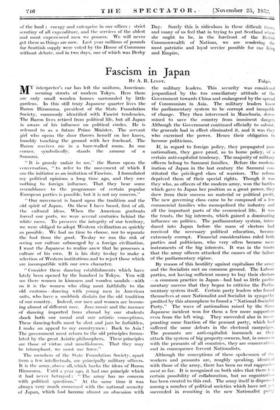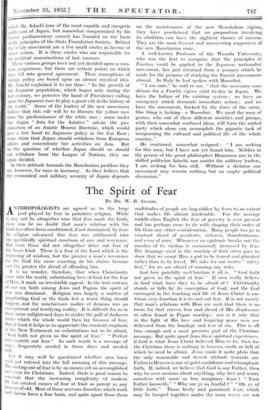Fascism in Japan By A. R. LINDT. Tokyo. • M Y
interpreter's car has left the uniform, American- seeming streets of modern Tokyo. Here there are only small wooden houses surrounded by little gardens. In this still truly Japanese quarter lives the Baron Hiranuma, president of the State Foundation Society, commonly . identified with Fascist tendencies. The Baron lives retired from political life, but all Japan is aware of his influence on political circles. He is referred to as a future Prime Minister._ The servant girl who opens the door throws herself on her knees, humbly touching the ground with her forehead: „The Baron receives me in a bare-walled room. In one corner, symbolically, stands the armour of a. Samurai.
" It is grossly unfair to me," the Baron opens the conversation, "to refer to the movement of which I_ am the initiator as an imitation of Fascism. I formulated my political opinions a long time ago, and they owe nothing to foreign influence. That they bear some resemblance to the programme of certain popular European parties is possible, but it is not my concern."' " Our movement is based upon the tradition and the old spirit of Japan. On these I have based, first of all, the cultural ideas. When the American gunboats forced our ports, we were several centuries behind the white races. To preserve the integrity of our territory, we were obliged to adopt Western civilization as quickly as possible. We had no time to choose, nor to separate the bad from the good. To-day we run the risk of seeing our culture submerged by a foreign civilization. I want the Japanese to realize anew that he possesses a culture of his own. It is his duty to-day to make a selection of Western institutions and to reject those which are incompatible with our own character.
Consider these dancing establishments which have lately been opened by the hundred in Tokyo. You will see there women in kimonos and wooden sandals—with us it is the women who cling most faithfully to the old customs—dancing with young men in American suits, who have a snobbish disdain for the old tradition of our country. Indeed, our men and women are becom- ing almost of different race. Jazz music and the manner of dancing imported from abroad by our students shock both our moral and our artistic conceptions. These dancing-halls must be shut and jazz be forbidden. I make an appeal to my countrymen : Back to Asia ! The government must return to the old principles formu- lated by the great Asiatic philosophers. These principles arc those of virtue and unselfishness. That they may be triumphant, we must use force."
The members of the State Foundation Society, apart from a few intellectuals, are principally military officers. It is the army, above all, which backs the ideas of Baron- Hiranuma. Until a year ago, it had one principle which it had never betrayed : "The army has no concern with political questions." At the same • time it was always very much concerned with the national security - of Japan, which had - become almost an obsession with the military leaders. This security was considered jeopardized "by the too conciliatory attitude of the Government towards China and endangered by the spread of Communism in Asia. The military leaders knew the parliamentary system to be corrupt and incapable of change. They then intervened in Manchuria, deter- mined to save the country from imminent danger. Although the Government continued officially to subsist, the generals had in effect eliminated it, and it was they who exercised the power. Hence their obligation to become politicians.
If, in regard to foreign policy, they propagated pure nationalism, they gave proof, as to home policy, of a certain anti-capitalist tendency. The majority of military officers belong to Samurai families. Before the modern- ization of Japan in the last century the Samurai con- stituted the privileged class of warriors. The reform deprived them of their special rights. Though it was they who, as officers of the modern army, won the battles which gave to Japan her position as a, great power, they drew from their success. no material or political profit. The new governing class came to be composed of a few commercial families who monopolised the industry and all the important parts of the economical life. It was the trusts, the big interests, which gained a dominating influence on politics. The parliamentary system, intro- duced into Japan before the mass of electors had received the necessary political education, became extremely corrupt. Financial considerations ruled both parties and politicians, who very often became mere instruments of the big interests. It was in the trusts that the army officers attacked the causes of the failure of the parliamentary regime.
By reason of this hostility against capitalism the army and the Socialists met on common ground. The Labour parties, not having sufficient money to buy their electors —a common practice in Japan—had had so little parlia- mentary success that they began to criticise the Parlia- mentary system itself. Certain party leaders who found themselves at once Nationalist and Socialist in sympathy profited by this atmosphere to found a "National-Socialist Party." The wave of nationalism raised by the Sino- Japanese incident won for .them a few more supporters even from the left wing. They succeeded also in incor- porating some fraction • of the peasant party, which had suffered the same defeats in the electoral campaigns. The peasants are anti-capitalist inasmuch as they attack the system of big property-owners, but, in common with the peasants of all countries, they arc conservative, and in consequence fervent Nationalists.
Although the conceptions of these spokesmen of t he workers and peasants are, roughly speaking, identical with those of the army, there has been no real rapproche- ment so far. It is recognized on both sides that there is a certain possibility of collaboration, but no organizatii has been created to this end. The army itself is disper,,..t among a number of political societies which have not yet. succeeded in reuniting in the new Nationalist part.). which Mr. Adachi (one of the most capable and energetic politicians of Japan, but somewhat compromised by his former parliamentary career) has founded on the basis of the principles of the State Foundation Society.. Behind the whole movement are a few small circles in favour of direct action. It is these circles who are responsible for the political assassinations of last summer.
These various groups have not yet decided upon a com- mon programme, but there are certain points on which they fall into general agreement. Their conceptions of loreign policy are based upon an almost mystical idea. Mr. Adachi explained it to me thus : "In the growth of the Japanese population, which began only during the last century, we perceive the hand of Providence 'calling upon the Japanese race top14 a great role in the history of the world." Some of the leaders of the new movement believe that this rale will be to liberate the yellow race from the predominance of the white race ; some under the slogan "Asia for the Asiatics" advise the pro- clamation of an Asiatic Monroe Doctrine, which would give a free hand to Japanese policy in the Far East ; some claim that Japan should withdraw from European affairs and concentrate her activities on Asia. But on the question of whether Japan should or should not withdraw from the League of Nations, they are again divided.
In their attitude towards the Manchurian problem they are, however, for once in harmony. As they believe that the economical and military security of Japan depends on the maintenance of the new Manchukuo regime, they have proclaimed that no proposition involving its abolition can have the slightest chance of success. They are the most fervent and unwavering supporters of the new Manchurian state.
A well-known Professor of the Waseda • University, who was the first to recognize that the principles of Fascism could be applied to the Japanese nationalist movement, has just returned from a journey which he made for the purpose of studying the Fascist movements abroad. In Italy he had spoken with Mussolini.
" I am sure," he said to me, " that the necessary con- ditions for a Fascist regime exist to-day in Japan. We have the failure of the existing system ; we have an emergency which demands immediate action ; and we have the movement, backed by the force of the army. One thing is lacking—a Mussolini. We need the man of genius, who out of these different societies and groups, with their somewhat confused ideas, will form the united party which alone can accomplish the gigantic task of reorganizing the cultural and political life of the whole country."
He continued, somewhat resigned : "I am seeking for this man, but I have not yet found him. Neither in the person of the great philosopher Hiranuma nor in the skilled politician Adachi, nor amidst the military leaders. I am seeking for him still. Without a dictator our movement may remain nothing but an empty political discussion."







































 Previous page
Previous page